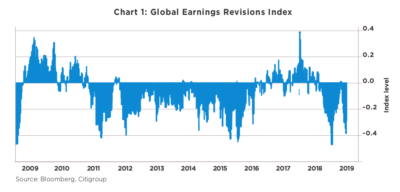Overcoming a slowing global economy
Overcoming a slowing global economy
With the threat of a global recession hanging over equity markets, and many bond yields in negative territory, we find ourselves faced with something of a conundrum. While we want to shelter portfolios from potential volatility, safer assets are offering very low returns and are at risk should inflation begin to rise.
Gold: the ideal diversifier
As a result of these conditions, we have recently made a moderate investment in gold. Gold is another way of owning money, but in a form that provides protection from rising inflation while offering returns when other asset classes are struggling. This strategy adds further diversification to portfolios and is a good way of offsetting some of the risks associated with prevailing marketing conditions.
We discuss this in more detail in our Investment View on page 2.
Monetary policy continues to support business
With interest rates remaining low, we continue to favour profitable and well-run companies that can access cheap financing to support a solid growth strategy. We will invest more in these solid and stable companies, while making sure we’re well positioned to take advantage of periods of volatility and good investment opportunities that arise.
Fiscal policy to stimulate growth
As we position portfolios to mitigate the shorter-term risk of a recession, we will also keep a close eye on fiscal policy and the associated longer-term inflation risks. In times of slow economic growth, pressure can build on governments to increase spending. We anticipate this will happen as they take advantage of cheap financing from the central banks.
Indeed, in his first Queen’s Speech in mid-October, Boris Johnson announced ambitious plans for the NHS, education, and funding care for the elderly, suggesting that the current UK Government has recognised the need to give the economy some fiscal support.
Investment view: Why gold offers shelter in times of uncertainty
With the global economy teetering on the edge of recession, and markets behaving somewhat erratically as a result, it’s important to ensure portfolios are as diversified as possible to mitigate latent risk. We’ve recently added gold to our portfolios for this very reason
Gold is the ideal diversifier. It behaves differently to other asset classes in that it does well when others struggle and when investors are feeling particularly pessimistic, while offering protection if inflation unexpectedly rises. Gold is another way of holding money while giving the opportunity for growth should the supply and demand go in its favour. This is particularly important in today’s environment of negative bond yields.

8 key attributes of gold
- Gold traditionally performs well when the US Dollar weakens as it becomes cheaper to buy in other currencies
- Gold can appreciate during times of equity market stress
- Gold should appreciate if inflation returns, while bonds would see losses
- Gold is portable
- Gold is divisible without a change of value (as opposed to diamonds)
- Gold is durable – it does not tarnish, evaporate or decay, burn or rust
- Gold cannot be inflated, is hard to produce and is rare
- Gold will become increasingly scarce and its value relative to other goods (purchasing power) should increase
It is important to note that there are risks to owning gold. Gold does not create an income, is subject to currency fluctuations and, depending on how it is held, can be illiquid and subject to high transactions charges or counterparty risk. We would only buy gold as part of a balanced portfolio.
Source: Sanlam Private Investments (UK) Ltd
Download: Market Outlook – November 2019.pdf
